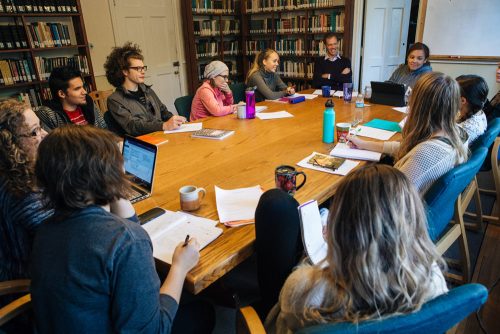
Once upon a time in the way back when, the role of higher education was not to prepare you for the treadmill by clipping you into a human coupon but, rather, to help you seek your better self through a spirit of open inquiry into the civilization in which fate had somehow plunked you. Sure, it’s an ideal, and that’s the point. College is supposed to be formative, not formulaic — revelatory, not rote. It’s supposed to make you a better person instead of a better cog.
At Gutenberg College, a “Great Books” liberal arts college in Eugene at 18th and University, this classic and all-too-rare spirit of inquiry and participation in one’s own education, equal parts Socratic and egalitarian, is the guiding principal.
Housed in a large brick colonial near the University of Oregon campus, Gutenberg currently has a student body of 26 undergraduates, a preponderance of whom live at the college; about half of the students are from outside Oregon, and a small percentage are from overseas. The school, which is a nonprofit corporation, offers a four-year bachelor’s degree in liberal arts, with about a third of students moving on to graduate school and many going on to teaching jobs. There are four full-time faculty members at Gutenberg, called tutors, as well as five part-time adjuncts. Annual tuition is $12,000.
The school’s small size and staff are mirrored in the pedagogical intimacy of its classroom dynamics. Rather than prepared lectures at Gutenberg, small classes of students — rarely more than five or six at a time — sit and discuss the canonical works of Western Civilization in a comfortable setting, facilitated by a tutor who prompts the discussion but often takes a backseat to the students’ own curiosity.
And, yes, the Gutenberg project is to view great books through a Christian lens (called the “biblical worldview” on the school’s website), but contrary to a lot of received opinion about what constitutes a Christian college, the religious aspect at Gutenberg is more open-ended than resolved. According to tutor Tim McIntosh, who also recruits for the college, “we believe equally and earnestly in the freedom of thought.”
The idea is that faith, ultimately, is a private matter, best arrived at by exposing students to the whole range of literature and ideas, from The Epic of Gilgamesh and The Iliad up through St. Anselm, Rousseau and, yes, Nietzsche, the German existentialist philosopher who famously claimed, “God is dead.”
McIntosh says that the openness and free flow of ideas at Gutenberg College can initially be off-putting for parents who find their freshman daughter coming home at Christmas break and suddenly declaring herself a fierce feminist, but such is the way of students allowed to think for themselves. “It’s hard and scary to give so much freedom to the students,” he says, “because if you give it to them and you really mean it, you don’t know where they’ll go with it.”
But, McIntosh adds, such freedom combined with issues of faith creates “a tension that I don’t think we ever will resolve and we don’t want to resolve.”
The value of such methodology becomes clear in the classroom setting, where a small clutch of students — all of them well-read, well-spoken and intensely curious — ping off each other as they dissect Homer’s depiction of Achilles, Agamemnon and the role of Greek gods in determining human affairs. The conversation flows organically, allowing the students to work their way toward insight and understanding.
Gutenberg student Meredith Bishop says she opted for Gutenberg because, rather than the “job training provided by most university programs,” she desired “a well-rounded education that would make me a better thinker and a better person. More than anything, I wanted to learn to think as an individual.”
According to Bishop, now a senior at the college, “the focus on discussion in Gutenberg classrooms allows the students to really grapple with the material,” an experience that has given her “a far greater understanding of the complexities and subtleties of the material.”
And, for Bishop, such complexities and subtleties extend to the school’s religious bent. “While Gutenberg is a Christian school, Christianity is not assumed as a set of first principles in the classroom,” she explains. “The tutors and many of the students belong to the Christian faith, yet the validity of any set of beliefs is never taken for granted. Everything, including the meaning and validity of the Christian faith, is up for discussion and debate.”
For more information about Gutenberg College, visit gutenberg.edu.